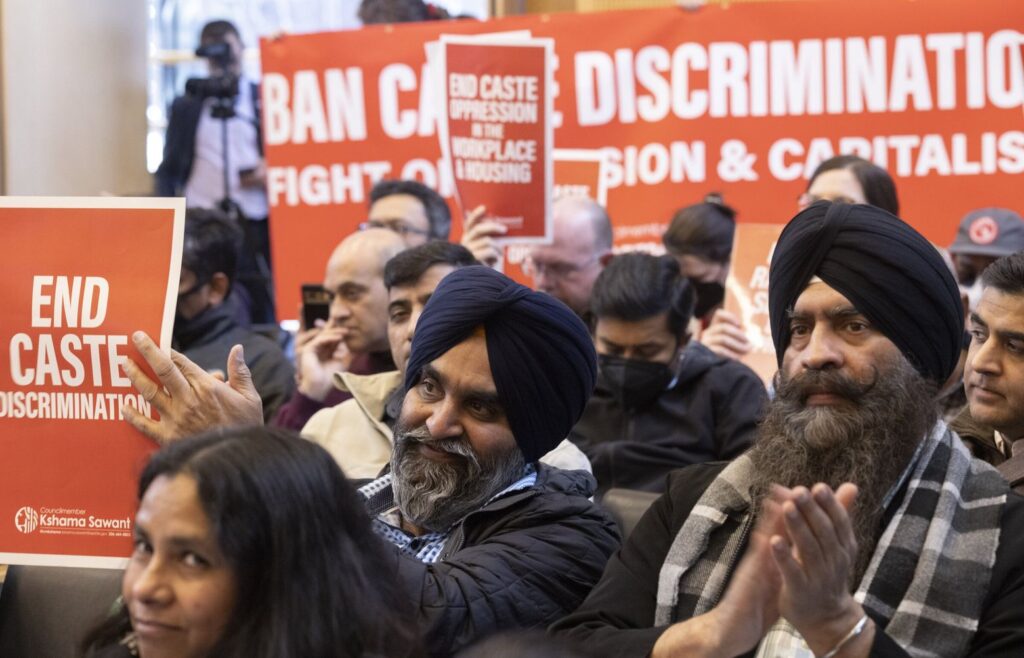Seattle made history Tuesday as the first city in the U.S. to expressly ban caste-based discrimination after an outpouring of input from South Asian Americans.
An ordinance introduced by District 3 Council member Kshama Sawant — Seattle’s only elected socialist and the only Indian American on the council — added caste to the list of statuses protected under Seattle’s existing anti-discrimination policies.
“This bill is not technically complicated, it’s a very simple question: Should discrimination based on caste be allowed to continue in Seattle?” Sawant said Tuesday, noting that she hopes the decision will be a “beacon” for other cities to follow suit.
“While simple, it is also profound and historic,” she added.
The City Council passed the caste discrimination ordinance in a 6-1 vote after thousands of letters and petition signatures and hours of public comment were received in the weeks leading up to, and during, Tuesday’s meeting. Toward the end of the meeting, District 2 Council member Tammy Morales, who presided over it via teleconference, warned audience members in attendance — on both sides of the issue — that they would be removed if they continued to interrupt council members as they spoke.
Council members Sawant, Morales, Lisa Herbold, Teresa Mosqueda, Alex Pedersen and Dan Strauss voted in favor of the new law, sending the rowdy crowd in council chambers into loud cheers. Council member Sara Nelson cast the sole vote against the ordinance, citing her fear of potential litigation from employers.
Council President Debora Juarez and Council member Andrew Lewis were absent from the meeting.
Caste is a hierarchical system, stemming from Hinduism in India, in which societal status is assigned to an individual at birth. Of the five main caste groups, those on the lowest rung of the system, members of the oppressed Dalit caste, are deemed “untouchables,” while the Brahmins, known as the priestly caste, reside at the top. There are thousands of subcastes, and while India officially banned the system, its influence is still felt in South Asia and by South Asians in America.
Though there are 150,000 Indian Americans in Washington, before Tuesday’s vote, someone who faced harassment or mistreatment based on caste would not be protected, unlike someone who faced gender, race or age discrimination, supporters of the ordinance argued.
While the U.S. has never formally recognized the caste system, South Asians have faced discrimination within workplaces and higher education, with a growing number of organizations working to recognize and combat casteism in recent years.
Last year, the California Department of Fair Employment and Housing was allowed by an appellate court to pursue a lawsuit against Cisco Systems, where an engineer was allegedly actively denied professional opportunities, a raise and promotions because of his caste background.
Brandeis University banned caste-based discrimination and harassment based on caste in 2019, and the University of California system — the largest state school system in the country — added caste to its discrimination protection policies in 2022.
Outpouring of support
In recent weeks, the vast majority of people who have sounded off support the ordinance. At Tuesday’s meeting alone, more than 300 people signed up to speak before the vote, with more than 100 people allowed to weigh in for nearly an hour and a half, both in person and remotely, before Morales closed public comment. About a dozen opposed the ordinance Tuesday, or asked the council to postpone the vote.
Opponents of the ordinance argue that the law will discriminate against Hindus and that with more than 2,000 different castes, it’s too complicated of an issue to enforce. Others thought it was hasty or unnecessary.
“Americans of South Asian descent aren’t born or raised with intrinsic knowledge of caste,” opponent Neha Singh said, later calling the ordinance “Hinduphobic.”
“This ordinance is attempting to create a formula in a space where no one knows what they’re talking about,” Singh added.
Before the vote Tuesday, Sawant’s office denounced the argument that the policy would harm Hindus, comparing the stance to that of Christians who claim same-sex marriage imposes on the religious rights of those who oppose it.
“Everybody understands this is a right-wing argument,” Sawant said in a statement published before the vote. “Genuine progressives support freedom of religion, but also understand that that cannot be an excuse to abuse LGBTQ people or discriminate against them.”
Supporters compared the system to apartheid and slavery, pleading for council members to pass the ordinance.
“It is not complex to decide against discrimination,” one speaker named Mohammed said.
“You don’t need to determine caste, you only need to determine whether to be the leader for the rest of the nation and make civil rights history,” he added.
Many of the Dalit or caste-oppressed individuals who spoke in favor of the ordinance withheld some or all of their names in public comment out of fear of retaliation from current employers. Groups ranging from religious organizations and higher education groups to the Alphabet Workers Union of Google employees spoke more freely in a joint letter sent to the City Council.
“We oppose racism, Islamophobia, xenophobia, anti-semitism, and other forms of hate and bigotry. We are troubled that caste-based discrimination is not currently prohibited under our anti-discrimination framework,” the letter co-signed by over 170 different organizations reads. “Like racism, casteism is a system of oppression; it is a very real — and growing — problem in our country and our local communities, but one that is not understood by most Americans.”
Council votes
While Nelson said caste discrimination is “abhorrent,” she voted against the ordinance, citing a “reckless” potential for a lawsuit — specifically noting the likelihood of one coming from a “well-resourced” tech employer.
“I’m concerned that designating caste as a protected class in Seattle is likely a reckless, unnecessary and harmful solution to a problem about which we have no data or research on its occurrence in Seattle,” Nelson said.
Nelson said she was also concerned that existing protections around ancestry would already cover caste discrimination. “Just because we can do something, doesn’t mean we should,” she said.
Noting that same ambiguity, Herbold said that the city should lean toward providing protections where there is gray area, noting the recent inclusion of pregnancy outcome, immigration status and others in city discrimination laws.
“I think it’s really important that we err on the side of protection against discrimination and have that legal clarity,” Herbold said.
Sawant rebuffed Nelson’s comments, arguing that previous human rights efforts such as race and gender equality would have been stunted if people hedged against progressive policies because of a fear of retaliation or lawsuits.
“Bring it on,” Sawant said to opponents in her closing statement.
(Sarah Grace Taylor is Seattle Times staff reporter. Courtesy: Seattle Times.)




